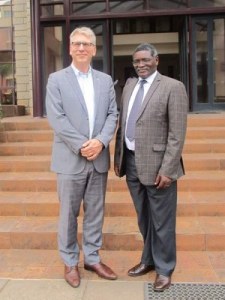
Contact: Media Office, World Council of Churches, +41 79 507 6363
NAIROBI, Kenya, Oct. 20, 2017 /Standard Newswire/ -- The following is submitted by Fredrick Nzwili*:
Church leaders in Kenya are proposing a national dialogue conference to help find ways of the resolving the current political and social crises facing the East African nation.
Photo: WCC general secretary Rev. Dr Olav Fykse Tveit and NCCK general secretary Rev. Peter Karanja during a WCC solidarity visit to Kenya. Photo: Marianne Ejdersten/WCC
Apart from discussing the stand-off over fresh presidential elections, it would also help resolve a longstanding nurses and clinical officers' strike.
On 10 October, the political crisis appeared to deepen after National Super Alliance leader Raila Odinga announced that his coalition would boycott the polls set for 26 October.
Odinga had cited the failure by the Independent Electoral and Boundaries Commission (IEBC) to institute some reforms he had demanded as an "irreducible minimum" before another election is held. High on the list of demands is the removal of officials in the commission who he believes caused him to lose the 8 August polls. One of the officials is the chief executive Ezra Chiloba.
But the withdrawal from the elections has thrown the church into a spin and further caused confusion in the process. Religious leaders have feared the action could throw the country into a long political crisis.
"We are seeking an understanding of the development," said the Rev. Peter Karanja, general secretary of the National Council of Churches of Kenya (NCCK) after the announcement. "The country has been in an election mood for far too long and I think it's time we brought it to end."
President Uhuru Kenyatta, the incumbent, had been declared the winner of the August polls, but following Odinga's petition, the Supreme Court annulled the result on 1 September, citing irregularities and illegalities.
Since then, Odinga has turned to the masses to push his agenda. Using the biblical image of the Israelites' journey from the bondage in Egypt to Canaan, he has called his supporters to streets to demand reforms in the IEBC. The protests have grown from twice each week to thrice and are expected to be held every day starting next week.
Although the protests are supposed to be peaceful, the protesters have been burning tires, blocking roads and lighting bonfires. This has resulted in clashes with riot police, who have been deployed to prevent any looting or attack on civilians. Scores have been injured in Nairobi and in opposition strongholds in western Kenya, where they have been more intense.
But while the opposition has taken to the streets, the ruling jubilee has retreated to parliament, where they passed a bill to reform the electoral laws. In seven amendments on the management of the elections, the bill proposes a new approach to transmission of results, announcement of the presidential winner and nullification of results.
Faith leaders have opposed these proposed changes, saying they will further worsen the crisis.
"This is an unacceptable path since it will lead to mutilation of the constitution and weakening of institutions," said Anglican Archbishop Jackson Ole Sapit at a news conference called after a meeting of the House of Bishops on 27 September.
At the moment, church leaders warn that the nation is on brink of disaster, unless political leaders embrace dialogue to solve the immediate challenges.
"The political class has put the country on an edge with their grandstanding over issues that would otherwise be resolved through genuine engagement," observed Archbishop Mophat Kiloba, the leader Pentecostal Evangelism Fellowship of Africa. Kiloba is chairperson of the NCCK's Programmes Committees.
With twists and turns starting to hurt the economy and social cohesion, Ole Sapit called for a change of course to the peaceful means of resolving the conflict.
"We can better address issues of concern through dialogue rather than through running battles on the street," said Ole Sapit.
Catholic bishops have also restated this position, saying that the current situation cannot be resolved unless the people reason together. If this not done, the country risks plunging into full-blown conflict and economic collapse.
"Dialogue will pre-empt the imminent conflict and violence being organised ….by politicians," said Bishop Philip Anyolo, chairman of the Kenya Conference of Catholic Bishops(KCCB).
The bishops together with other faith leaders have been reaching out at politicians urging them to dialogue.
Meanwhile, the politicians have engaged in insults and accusations, raising concerns over turmoil in the nation. There is also mobilisation of gangs for violence in different parts of the country.
Analysts say Kenya's problem is captured in a political system based on winner takes it all and a loser loses everything. This is fate that befalls contesters in each election, which makes it difficult to accept an election outcome. These are underlying realities that must be addressed to deal with the current situation, according to the NCCK.
* Fredrick Nzwili is an independent journalist based in Nairobi, Kenya.
"Called to be a good neighbor" (WCC news release 14 October 2017)
WCC member churches in Kenya
The World Council of Churches promotes Christian unity in faith, witness and service for a just and peaceful world. An ecumenical fellowship of churches founded in 1948, today the WCC brings together 348 Protestant, Orthodox, Anglican and other churches representing more than 550 million Christians in over 120 countries, and works cooperatively with the Roman Catholic Church. The WCC general secretary is the Rev. Dr Olav Fykse Tveit, from the [Lutheran] Church of Norway.




 Sign Up to Receive Press Releases:
Sign Up to Receive Press Releases: